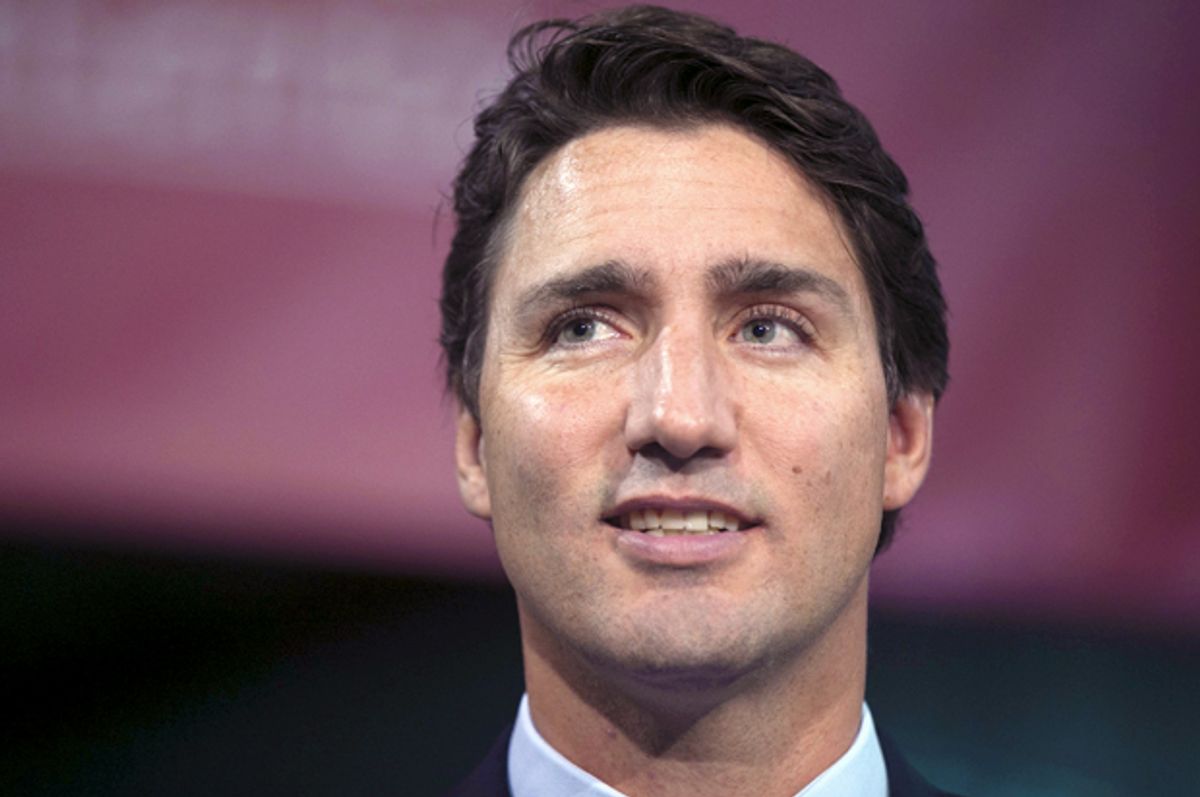Free-trade deals are like kryptonite this election season, but not for America's neighbor to the north: A sweeping trade agreement between Canada and the EU is nearing approval. To proponents of the deal, who include Canadian Prime Minister Justin Trudeau, it will be a win for everyone involved, wiping out 98 percent of tariffs and lowering export costs on everything from Polish apples to Canadian aluminum, adding billions of dollars to transatlantic trade. If it’s approved as early as next week, customs duties would be removed and companies would be able to freely move employees between Canada’s 10 provinces and the EU’s 28 member states.
But critics view the Comprehensive Economic and Trade Agreement, or CETA, very differently. Environmentalists, consumer advocates and trade unions see modern trade deals like CETA as empowering big business to walk over the interests of consumers, workers and environmentalists. They point to clauses that create new arbitration courts that let foreign companies and investors extract settlements for regulations that hurt their profits. Canada, for example, has been sued for millions of dollars numerous times by companies under provisions of the North American Free Trade Agreement for passing laws strengthening environmental regulations but weakening corporate profits.
“There is a worry that we are slowly sliding towards a situation where governments ultimately have very little say, certainly individual governments have very little say, in the running of [public] affairs,” Mike Ingram, Market Strategist for BGC Partners, told Reuters on Tuesday. “It’s all basically pandering to the needs of multinationals.”
Europe’s leaders will attempt on Friday to iron out some final wrinkles to ratifying CETA. The deal still faces opposition from one of Belgium’s three political regions, as well as Romania and Bulgaria, who are demanding Canada lift visa requirements for their travelers. But officials say they’re hopeful these issues will be worked out by the time Trudeau is due to arrive in Brussels next Thursday for a Canada-EU summit. If a deal is signed then, the agreement would go into effect on Jan. 1.
If CETA passes, it could inspire more effort to pass a U.S. version of CETA. The Transatlantic Trade and Investment Partnership, or TTIP, is essentially a much larger version of the Canadian agreement but shares many of the controversial attributes, such as standardizing rules covering everything from food safety to banking. Passing the TTIP would create the world’s largest preferential trade zone encompassing more than 800 million people.
In addition to the skepticism here in the U.S., that deal faces growing resistance in Europe, where the public fears the TTIP would force Europeans to adopt U.S. standards on everything from GMO labeling laws to anti-consumer drug-pricing practices. Talks was were effectively put on hold last month during a meeting of EU trade ministers. Austria, Luxembourg, Slovenia and, most important, France, all still oppose making a deal with the U.S.
Earlier this year, millions of Europeans voiced their opposition to TTIP in the streets and in public petitions, while an opinion poll conducted by YouGov for the Bertelsmann Foundation found that only 17 percent of Americans and 18 percent of Germans support TTIP, a significant decline from the 55 percent and 53 percent just two years earlier.
The attacks on trade liberalization seems to be coming from all corners, not just lefty labor leaders and environmentalists but also those on the right who back on U.S. Republican presidential candidate Donald Trump’s anti-free-trade rhetoric. Similar sentiments prompted millions of British voters to support — and narrowly pass — the Brexit referendum in June.
This backlash is running so hot right now that Christine Lagarde, International Monetary Fund's managing director, warned earlier this month that countries need to do more to spread out the benefits of increasing global trade flows, “to pay attention to those at risk of being left out.” Others have echoed similar sentiments.
The public’s perception that these trade deals benefit only big corporate interests and the superrich has been aided by growing income inequality. As more and more people come out against free-trade agreements, CETA could be the last of its kind for some time.
UPDATED 10/21/2016: In a blow to the passage of CETA, one of Belgium’s three semi-autonomous regions stood firmly Friday against approving the agreement, the BBC reported. Negotiators had expressed as recently as Thursday that it could come to an agreement with the regional parliament of Wallonia, a strongly socialist region of 3.8 million Belgians. But the local lawmakers have so far stood firm, expressing concern over how the deal would impact farmers and public social benefits. The concern echoing sentiments of anti-globalization activists that have fought hard against CETA and other preferential trade deals, including the TTIP and the 12-nation Trans-Pacific Partnership (TPP) that U.S. President Barack Obama had hoped to pass before the end of his term. It’s unclear if E.U. negotiators would continue to negotiate with the Wallonians ahead of a planned E.U.-Canada summit next week.



Shares